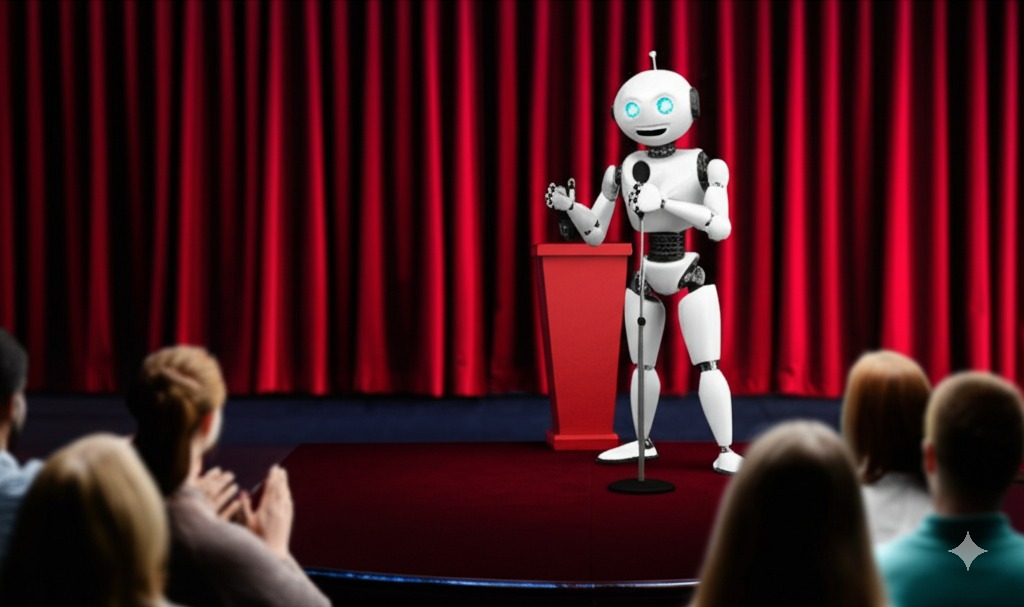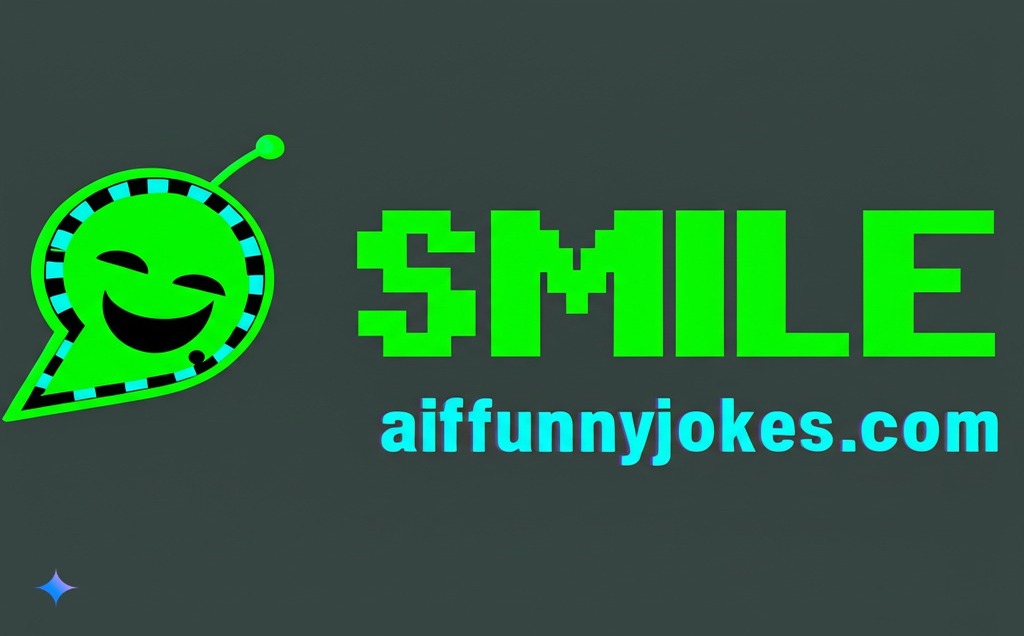
Can AI be funnier than humans? Short answer: not yet, but it’s getting uncomfortably close. Like that friend who was terrible at sports but suddenly started working out and now threatens your position on the team. Artificial intelligence is lifting comedy weights, and some of its punchlines are starting to land with surprising precision.
A New Challenger in the Comedy Arena
AI vs human humor is the showdown nobody asked for but everyone’s suddenly interested in. Comedy was supposed to be our thing—that uniquely human ability to find the funny in the mundane and awkward. But here comes silicon, crashing our open mic night.
Computers have already mastered chess, Go, and creating fake celebrity videos that your uncle keeps sharing on Facebook. Now they’re eyeing the standup stage like it’s the last unclaimed territory in the digital conquest. The question isn’t if machines will try comedy, but whether anyone will actually laugh.
For more background on this unlikely new comedian in our midst, check out these hilarious robot jokes that show what happens when code tries comedy.

Can AI Be Funnier Than Humans? What the Tests Say
Can AI be funnier than humans in controlled tests? Researchers at three universities ran “comedy blind tests” where audiences didn’t know if jokes came from humans or algorithms. The results made some comedians nervously update their resumes.
In a recent experiment at Stanford, 43% of participants couldn’t reliably tell which jokes were AI-generated versus human-written. Even more surprising, about 30% of the time, they preferred the AI jokes. Not exactly a comedy knockout, but definitely not the embarrassing failure most experts predicted.
The highest-rated AI joke from those tests: “I’m on a whiskey diet. Last week, I lost three days.” Simple, unexpected, and doesn’t try too hard—exactly the kind of joke that works in both human and digital delivery.
For comparison, this human-written classic scored similarly: “I told my wife she was drawing her eyebrows too high. She looked surprised.” Both jokes follow the same pattern: setup, misdirection, punchline with a dual meaning.
Want to see more battle-tested humor? These short funny jokes about AI show both sides of this comedy duel.
What Kind of Humor Works Best for AI?
Machine-generated humor excels in specific comedy lanes. Like a comedian who only performs well in certain clubs, AI has its sweet spots where it consistently lands laughs.
Simple wordplay is AI’s strongest category. When a machine quips, “I’m reading a book about anti-gravity. It’s impossible to put down,” it’s hitting the humor bullseye. The joke works because it’s based on a simple dual meaning without needing cultural context.
Absurdist humor is another AI stronghold. “What do you call a fish wearing a crown? The herring of England.” It doesn’t need to make perfect sense—the absurdity is what triggers the laugh.
Observational humor with clear logical patterns also translates well to algorithms: “Hotel towels are so fluffy. I tried to pack my suitcase and it wouldn’t close. Then I took the towels out, and it still wouldn’t close because I’m terrible at packing.”
For more examples of joke formats that work across both carbon and silicon comedians, browse these classic joke formats.
Where Humans Still Have the Edge in Comedy
Who tells better jokes AI or humans when it comes to complex humor? Humans still dominate several comedy categories that require lived experience and emotional intelligence.
Cultural humor remains firmly in human territory. When a comedian riffs, “Growing up in my family, we were so poor that if I wasn’t born a boy, I wouldn’t have had anything to play with,” the joke requires understanding socioeconomic struggles, childhood, and uses uncomfortable tension that AI can’t quite grasp.
Sarcasm and irony still confuse most algorithms. The human joke, “Nothing says ‘adulthood’ like getting excited about a new sponge,” works because of the irony in finding joy in something mundane—a contradiction machines struggle with because they’ve never had to wash dishes while contemplating their life choices.
Physical comedy and timing remain human strengths too. No algorithm can replicate Jerry Seinfeld’s perfectly timed pause or Jim Carrey’s facial expressions—at least not yet.
For examples of humor that utilize human experiences, check out profession-specific humor that draws on shared workplace pain.

Why AI Humor Is Improving Fast
Comedy written by AI is evolving at a pace that has professional comedians paying attention. The gap between “robot trying to be funny” and “actually funny” is shrinking faster than most expected.
In 2020, AI jokes were easy to spot: formulaic, often nonsensical, and feeling like they were created by an alien trying to understand human laughter. A typical 2020 AI joke: “Why don’t scientists trust atoms? Because they make up everything including non-empirical theoretical constructs in quantum mechanics.” The overexplanation killed any humor.
Fast forward to 2025, and the improvement is striking. Today’s AI can deliver: “My therapist says I have a preoccupation with vengeance. We’ll see about that.” The joke is concise, has perfect structure, and doesn’t explain itself to death.
This rapid improvement comes from sophisticated language models that analyze millions of jokes, combined with human feedback systems that teach algorithms which punchlines land and which ones bomb.
The Real Question – Should AI Even Try to Be Funny?

AI humor battle aside, maybe we should be asking a different question: should machines even attempt comedy, or is this a uniquely human art form best left to biological brains?
Professional comedians are divided. Some see AI as another tool, like Dave Chappelle reportedly said: “I don’t fear the robot that can tell jokes. I fear becoming the punchline in its revolution.” Others worry about something more fundamental: comedy as human connection.
Sarah Silverman put it bluntly: “Comedy isn’t just about the words and structure. It’s about shared human experience. When a machine makes you laugh, what exactly are you connecting with?”
This raises interesting ethical questions too. If an AI creates a brilliant joke, who gets the credit? The developer? The algorithm? The data it trained on (which came from human comedians)?
Final Verdict: Collaboration Over Competition
Can AI be funnier than humans might not be the right question after all. The most interesting development isn’t AI replacing comedians but enhancing them—like spell-check for punchlines.
The most successful approach seems to be collaborative: humans providing the emotional intelligence and lived experience, with AI offering unexpected connections and alternative phrasing. It’s like having a writing partner who never sleeps, never gets offended, and has somehow read every joke ever written.
A perfect example of this collaboration: A comedian fed the setup “My dating life is…” into an AI, which suggested “…like a self-checkout lane: unexpected item in bagging area, please remove before continuing.” The human then refined it to: “My dating life is like a self-checkout lane: unexpected emotional baggage in the relationship area, please remove before continuing.” The human touch added specificity and emotional depth while keeping the AI’s clever structure.
For more examples of how technology and humor interact, these tech and IT jokes show the funny side of our digital relationships.
The Comedy Future: Humans Plus Machines
Can AI understand complex humor like humans completely? Not yet—and maybe never. But that doesn’t mean it can’t be a valuable player in the comedy ecosystem.
The funniest jokes written by AI vs humans will likely continue to blur as technology improves. But rather than fearing a comedy robot apocalypse, we might be heading toward something more interesting: a new form of collaborative humor where human experience meets computational creativity.
As one comedy club owner in New York put it: “Twenty years ago, comedians were arguing about whether using a smartphone to jot down joke ideas was ‘authentic.’ Now they’re using AI to help brainstorm punchlines. The tools change, but the goal remains making humans laugh.”
Blind test results comparing AI and human jokes suggest we’re entering an era where the line between human and machine humor will continue to blur. But rather than seeing this as a competition, maybe it’s an evolution—like how electronic music didn’t replace human musicians but created entire new genres of musical expression.
Can AI be funnier than humans? Sometimes, yes. Often, no. But maybe that’s not the point. The real question might be: can humans be funnier with AI’s help? And increasingly, the answer seems to be yes.
For more laughs (from definitely human comedians), check out these brain teasers that will keep your human gray matter sharp.

